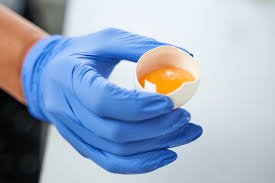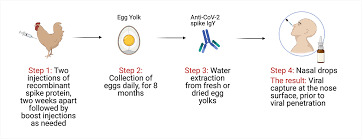What do we really know about Chicken Egg Yolk Antibodies and Covid?

Do we have real scientific research about this topic? Yes
Brief review of some scientific literature
[1] Chicken Egg Yolk Antibodies (IgYs) block the binding of multiple SARS-CoV-2 spike protein variants to human ACE2
#source: Int Immunopharmacol 2021 Jan;90:107172. doi: 10.1016/j.intimp.2020.107172. Epub 2020 Nov 3.
- My Summary: The virus is infecting people worldwide, and many new versions of original are developing. This antibody from chicken yokes has been shown to neutralize the virus spike protein cell binding ability, which means to stop it from binding with cell membranes and infecting cells. It al;so has stopped the virus protein from binding with something called ACE2, and stopping this virus activity stops the abnormal blood clots which cause Covid 19 infection complications.
[2] Immunoglobulin yolk targeting spike 1, receptor binding domain of spike glycoprotein and nucleocapsid of SARS-CoV-2 blocking RBD-ACE2 binding interaction
#source: Int Immunopharmacol 2022 Nov;112:109280. doi: 10.1016/j.intimp.2022.109280. Epub 2022 Sep 28.
- My Summary: This study confirmed that this chicken antibody could neutralize covid spike protein in the lab. It is known that this caopability prevents Covid infection in Humans. It also confirmed that immunized chickens could provide this antibody in their eggs, within weeks of immunization.
[3] Egg yolk immunoglobulin (IgY) targeting SARS-CoV-2 S1 as potential virus entry blocker
#source: J Appl Microbiol 2022 Mar;132(3):2421-2430. doi: 10.1111/jam.15340. Epub 2021 Nov 3.
- My Summary
This research showed that after immunizing chickens for Covid, the scientists could isolate an antibody in their egg yolks, and this antibody binds to the virus and prevents the virus from binding to the cell memberane site responsible for the viruses entry into cells and thus infection. They also feel they can prepare or create an oral preparation of this antibody, or a nasal spray of this antibody and it could be used for by people after exposure to the covid virus, in an attempt to stop infection.
[4] SARS-CoV-2-specific immunoglobulin Y antibodies are protective in infected mice
#source: PLoS Pathog 2022 Sep 19;18(9):e1010782. doi: 10.1371/journal.ppat.1010782. eCollection 2022 Sep.
- My Summary
The scientists feel we need safe, effective means to prevent severe Covid Infections. They state that we know that immunizing chickens against covid 19 makes them produce antibodies to Covid-19 in their eggs, specifically the egg yolks. The tscientists gave this egg yolk derived antibody, as in antibody taken from chicken egg yolks to make a nasal spray, and sprayed it in the noses of mice. They then exposed the mice to a mouse strain of Covid which causes severe Covid disease. The mice given the nasal spray had less deaths, and less severe infections then mice not given the nasal spray.
[5] Egg-Derived Anti-SARS-CoV-2 Immunoglobulin Y (IgY) With Broad Variant Activity as Intranasal Prophylaxis Against COVID-19
- source: Clinical Trial Front Immunol 2022 Jun 1;13:899617. doi: 10.3389/fimmu.2022.899617.
My Summary:
- Scientists develop nasal drops for humans to use, which contained antibodies to Covid 19 which are extracted from egg yolks of vaccinated chickens.
- These chicken egg yolk antibodies showed an ability to neutralized virus at it's entry point to the body, the nose.
- These nasal drops were effective against the original strain of Covid and all subsequent variants.
- The nasal drops were tested against Alpha (B.1.1.7), Beta (B.1.351), Delta (B.1.617.2), and Omicron (B.1.1.529).
- Safety studies in the lab, using multiple types of human tissue the nasal drops could come in contact with showed these antibodies don't attack in known human tissue type, and Rat studies showed no problems after 28 days of daily nasal administration.
Safety studies showed no trace of these antibodies in the blood or tissues of Rat subjects - The first human safety study study using 48 adult humans, and after 14 days of nasal administration there were no side effects. - This human safety study showed no evidence of systemic absorption.
Detailed dive into these articles, their abstracts and my summary.
[1] Chicken Egg Yolk Antibodies (IgYs) block the binding of multiple SARS-CoV-2 spike protein variants to human ACE2
#source: Int Immunopharmacol 2021 Jan;90:107172. doi: 10.1016/j.intimp.2020.107172. Epub 2020 Nov 3.
Abstract
The SARS-CoV-2 virus is still spreading worldwide, and there is an urgent need to effectively prevent and control this pandemic. This study evaluated the potential efficacy of Egg Yolk Antibodies (IgY) as a neutralizing agent against the SARS-CoV-2. We investigated the neutralizing effect of anti-spike-S1 IgYs on the SARS-CoV-2 pseudovirus, as well as its inhibitory effect on the binding of the coronavirus spike protein mutants to human ACE2. Our results show that the anti-Spike-S1 IgYs showed significant neutralizing potency against SARS-CoV-2 pseudovirus, various spike protein mutants, and even SARS-CoV in vitro. It might be a feasible tool for the prevention and control of ongoing COVID-19.
Keywords: Chicken Egg Yolk Antibodies; IgY; Neutralizing agent; SARS-CoV-2; Spike protein variants.
Copyright © 2020 Elsevier B.V. All rights reserved.>.
MY SUMMARY:
- The virus is infecting people worldwide, and many new versions of original are developing. This antibody from chicken yokes has been shown to neutralize the virus spike protein cell binding ability, which means to stop it from binding with cell membranes and infecting cells. It al;so has stopped the virus protein from binding with something called ACE2, and stopping this virus activity stops the abnormal blood clots which cause Covid 19 infection complications.
[2] ****Immunoglobulin yolk targeting spike 1, receptor binding domain of spike glycoprotein and nucleocapsid of SARS-CoV-2 blocking RBD-ACE2 binding interaction****
#source: Int Immunopharmacol 2022 Nov;112:109280. doi: 10.1016/j.intimp.2022.109280. Epub 2022 Sep 28.
Abstract
Coronavirus disease (COVID)-19 caused by severe acute respiratory syndrome coronavirus 2 (SARS-CoV-2) infection has ... An alternative mitigation strategy may involve the use of specific immunoglobulin (Ig)-Y derived from chicken eggs. Our study aimed to evaluate the neutralizing potential of specific IgY targeting S1, receptor-binding-domain (RBD) of spike glycoprotein and nucleocapsid (N) of SARS-CoV-2 to inhibit RBD and angiotensin-converting-enzyme-2 (ACE2) binding interaction. Hy-Line Brown laying hens were immunized with recombinant S1, RBD spike glycoprotein, and nucleocapsid (N) of SARS-CoV-2. The presence of specific S1,RBD,N-IgY in serum and egg yolk was verified by indirect enzyme-linked immunosorbent assay (ELISA). Specific S1,RBD,N-IgY was purified and characterized from egg yolk using sodium-dodecyl-sulfate-polyacrylamide-gel-electrophoresis (SDS-PAGE), and was subsequently evaluated for inhibition of the RBD-ACE2 binding interaction in vitro. Specific IgY was present in serum at 1 week post-initial immunization (p.i.i), whereas its present in egg yolk was confirmed at 4 weeks p.i.i. Specific S1,RBD,N-IgY in serum was able to inhibit RBD-ACE2 binding interaction between 4 and 15 weeks p.i.i. The results of the SDS-PAGE revealed the presence of bands with molecular weights of 180 kDa, indicating the presence of whole IgY.
> Our results demonstrated that S1,RBD,N-IgY was able to inhibit RBD-ACE2 binding interaction in vitro, suggesting its potential use in blocking virus entry. Our study also demonstrated proof-of-concept that laying hens were able to produce this specific IgY, which could block the viral binding and large production of this specific IgY is feasible.
Keywords: Angiotensin-converting-enzyme-2; Binding interaction; Immunoglobulin Y; Laying hens; Receptor-binding-domain; SARS-CoV-2.
Copyright © 2022 Elsevier B.V. All rights reserved.
My SUMMARY
- This study confirmed that this chicken antibody could neutralize covid spike protein in the lab. It is known that this caopability prevents Covid infection in Humans. It also confirmed that immunized chickens could provide this antibody in their eggs, within weeks of immunization.
_
[3] Egg yolk immunoglobulin (IgY) targeting SARS-CoV-2 S1 as potential virus entry blocker
#source: J Appl Microbiol 2022 Mar;132(3):2421-2430. doi: 10.1111/jam.15340. Epub 2021 Nov 3.
Abstract
Aims: COVID-19 pandemic caused by SARS-CoV-2 has become a public health crisis worldwide. In this study, we aimed at demonstrating the neutralizing potential of the IgY produced after immunizing chicken with a recombinant SARS-CoV-2 spike protein S1 subunit.
Methods and results: E. coli BL21 carrying plasmid pET28a-S1 was induced with IPTG for the expression of SARS-CoV-2 S1 protein. The recombinant His-tagged S1 was purified and verified by SDS-PAGE, Western blot and biolayer interferometry (BLI) assay. Then S1 protein emulsified with Freund's adjuvant was used to immunize layer chickens. Specific IgY against S1 (S1-IgY) produced from egg yolks of these chickens exhibited a high titer (1:25,600) and a strong binding affinity to S1 (KD = 318 nmol L-1 ). The neutralizing ability of S1-IgY was quantified by a SARS-CoV-2 pseudotyped virus-based neutralization assay with an IC50 value of 0.99 mg ml-1 . In addition, S1-IgY exhibited a strong ability in blocking the binding of SARS-CoV-2 S1 to hACE2, and it could partially compete with hACE2 for the binding sites on S1 by BLI assays.
Conclusions: We demonstrated here that after immunization of chickens with our recombinant S1 protein, IgY neutralizing antibodies were generated against the SARS-CoV-2 spike protein S1 subunit; therefore, showing the potential use of IgY to block the entry of this virus.
Significance and impact of the study: IgY targeting S1 subunit of SARS-CoV-2 could be a promising candidate for pre- and post-exposure prophylaxis or treatment of COVID-19. Administration of IgY-based oral preparation, oral or nasal spray may have profound implications for blocking SARS-CoV-2.
Keywords: COVID-19; S1; SARS-CoV-2; antibody; egg yolk immunoglobulin Y (IgY); hACE2.
© 2021 The Society for Applied Microbiology.
My Summary
This research showed that after immunizing chickens for Covid, the scientists could isolate an antibody in their egg yolks, and this antibody binds to the virus and prevents the virus from binding to the cell memberane site responsible for the viruses entry into cells and thus infection. They also feel they can prepare or create an oral preparation of this antibody, or a nasal spray of this antibody and it could be used for by people after exposure to the covid virus, in an attempt to stop infection.
[4] SARS-CoV-2-specific immunoglobulin Y antibodies are protective in infected mice
#source: PLoS Pathog 2022 Sep 19;18(9):e1010782. doi: 10.1371/journal.ppat.1010782. eCollection 2022 Sep.
Abstract
Safe, passive immunization methods are required against severe acute respiratory syndrome coronavirus-2 (SARS-CoV-2) and its variants. Immunization of chickens with antigen is known to induce specific IgY antibodies concentrated in the egg yolk and has a good safety profile, high yield of IgY per egg, can be topically applied, not requiring parenteral delivery. Our data provide the first evidence of the prophylactic efficacy of Immunoglobulin Y antibodies against SARS-CoV-2 in mice. Lohmann hens were injected with recombinant SARS-CoV-2 RBD protein; IgY-Abs were extracted from the eggs and characterized using SDS-PAGE. Antiviral activity was evaluated using plaque reduction neutralization tests. In additional experiments, IgY-RBD efficacy was examined in mice sensitized to SARS-CoV-2 infection by transduction with Ad5-hACE2 (mild disease) or by using mouse-adapted virus (severe disease). In both cases, prophylactic intranasal administration of IgY-Abs reduced SARS-CoV-2 replication, and reduced morbidity, inflammatory cell infiltration, hemorrhage, and edema in the lungs and increased survival compared to control groups that received non-specific IgY-Abs. These results indicate that further evaluation of IgY-RBD antibodies in humans is warranted.
Conflict of interest statement
The authors have declared that no competing interests exist.
My Summary
The scientists feel we need safe, effective means to prevent severe Covid Infections. They state that we know that immunizing chickens against covid 19 makes them produce antibodies to Covid-19 in their eggs, specifically the egg yolks. The tscientists gave this egg yolk derived antibody, as in antibody taken from chicken egg yolks to make a nasal spray, and sprayed it in the noses of mice. They then exposed the mice to a mouse strain of Covid which causes severe Covid disease. The mice given the nasal spray had less deaths, and less severe infections then mice not given the nasal spray.
[5] Egg-Derived Anti-SARS-CoV-2 Immunoglobulin Y (IgY) With Broad Variant Activity as Intranasal Prophylaxis Against COVID-19
- source: Clinical Trial Front Immunol 2022 Jun 1;13:899617. doi: 10.3389/fimmu.2022.899617.
Abstract
COVID-19 emergency use authorizations and approvals for vaccines were achieved in record time. However, there remains a need to develop additional safe, effective, easy-to-produce, and inexpensive prevention to reduce the risk of acquiring SARS-CoV-2 infection. This need is due to difficulties in vaccine manufacturing and distribution, vaccine hesitancy, and, critically, the increased prevalence of SARS-CoV-2 variants with greater contagiousness or reduced sensitivity to immunity. Antibodies from eggs of hens (immunoglobulin Y; IgY) that were administered the receptor-binding domain (RBD) of the SARS-CoV-2 spike protein were developed for use as nasal drops to capture the virus on the nasal mucosa. Although initially raised against the 2019 novel coronavirus index strain (2019-nCoV), these anti-SARS-CoV-2 RBD IgY surprisingly had indistinguishable enzyme-linked immunosorbent assay binding against variants of concern that have emerged, including Alpha (B.1.1.7), Beta (B.1.351), Delta (B.1.617.2), and Omicron (B.1.1.529). This is different from sera of immunized or convalescent patients. Culture neutralization titers against available Alpha, Beta, and Delta were also indistinguishable from the index SARS-CoV-2 strain. Efforts to develop these IgY for clinical use demonstrated that the intranasal anti-SARS-CoV-2 RBD IgY preparation showed no binding (cross-reactivity) to a variety of human tissues and had an excellent safety profile in rats following 28-day intranasal delivery of the formulated IgY. A double-blind, randomized, placebo-controlled phase 1 study evaluating single-ascending and multiple doses of anti-SARS-CoV-2 RBD IgY administered intranasally for 14 days in 48 healthy adults also demonstrated an excellent safety and tolerability profile, and no evidence of systemic absorption. As these antiviral IgY have broad selectivity against many variants of concern, are fast to produce, and are a low-cost product, their use as prophylaxis to reduce SARS-CoV-2 viral transmission warrants further evaluation.
Clinical trial registration: https://www.clinicaltrials.gov/ct2/show/NCT04567810, identifier NCT04567810.
Keywords: COVID-19; IgY; SARS-CoV-2; chicken immunoglobulin; clinical trial body; immunoglobulin Y; infectious diseases.
Copyright © 2022 Frumkin, Lucas, Scribner, Ortega-Heinly, Rogers, Yin, Hallam, Yam, Bedard, Begley, Cohen, Badger, Abbasi, Dye, McMillan, Wallach, Bricker, Joshi, Boon, Pokhrel, Kraemer, Lee, Kargotich, Agochiya, John and Mochly-Rosen.
My Summary:
- Scientists develop nasal drops for humans to use, which contained antibodies to Covid 19 which are extracted from egg yolks of vaccinated chickens.
- These chicken egg yolk antibodies showed an ability to neutralized virus at it's entry point to the body, the nose.
- These nasal drops were effective against the original strain of Covid and all subsequent variants.
- The nasal drops were tested against Alpha (B.1.1.7), Beta (B.1.351), Delta (B.1.617.2), and Omicron (B.1.1.529).
- Safety studies in the lab, using multiple types of human tissue the nasal drops could come in contact with showed these antibodies don't attack in known human tissue type, and Rat studies showed no problems after 28 days of daily nasal administration.
- Safety studies showed no trace of these antibodies in the blood or tissues of Rat subjects .
- The first human safety study study using 48 adult humans, and after 14 days of nasal administration there were no side effects.
- This human safety study showed no evidence of systemic absorption.
- The ant
Last words and my my conclusions:

- Interestingly, humans pass immunity to baby humans, in the form of the mothers antibodies in the mothers breast milk. But chickens pass immunity to baby chickens via the egg yolk.
- These studies indicate that chickens immunized to Covid produce antibodies to covid, which are found in their eggs, specifically the yolks.
- Scientists can mass produce this antibody cheaply, and make oral and nasal preparations for humans to use after exposure to Covid 19.
- These preparations stop Covid at it's entry point to the body, the nose.
- These antibodies stop infection from the original strain of covid and all subsequent variants.
- These preparations can be used after exposure to Covid and don't involve shots, and the antibodies have not been shown to be absorbed in to the body after taking them everyday for two weeks or 14 days.
- Humans have been eating chickens and chicken eggs for thousands of years.
- Humans can use these egg yolks derived antibodies nasally, to prevent Covid, and because we have been exposed to egg yolks for centuries, it appears we will have no problems with these egg yolk antibodies, unless we are a member of the small percentage of humans who are allergic to eggs.
- HOWEVER, we can't just eat eggs to get this protection. Your digestive system doesn't distinguish steak from fish from eggs. Your stomach sees them all as proteins, which must be broken down to their building blocks, aminio acids. This process destroys any special activity they could perform. Think of like melting an Igloo, a house of large blocks of ice. It goes from a house to a big puddle of water, no longer caopable of providing shelter from the wind rain or cold. If you eat the egg yolks, the antibodies will no longer be Covid Antibodies, they will become protein.
References for eating eggs:
Confusing titles, they mean eating eggs doesn't confer immunity.
Summary statement
- The science is beginning to accumulate to support this as an alternative to or supplement to vaccinations to porevent the Covid 19 infections.
- I am excited to see a cheap, painless and low risk alternative to Covid infections, and I wonder what other uses this technology will provide.
@shortsegments

-##### What do we really know about Chicken Egg Yolk Antibodies and Covid?